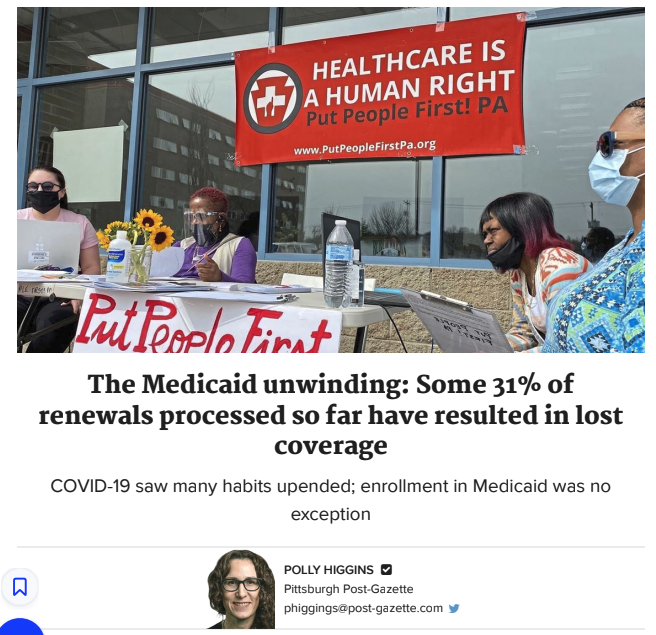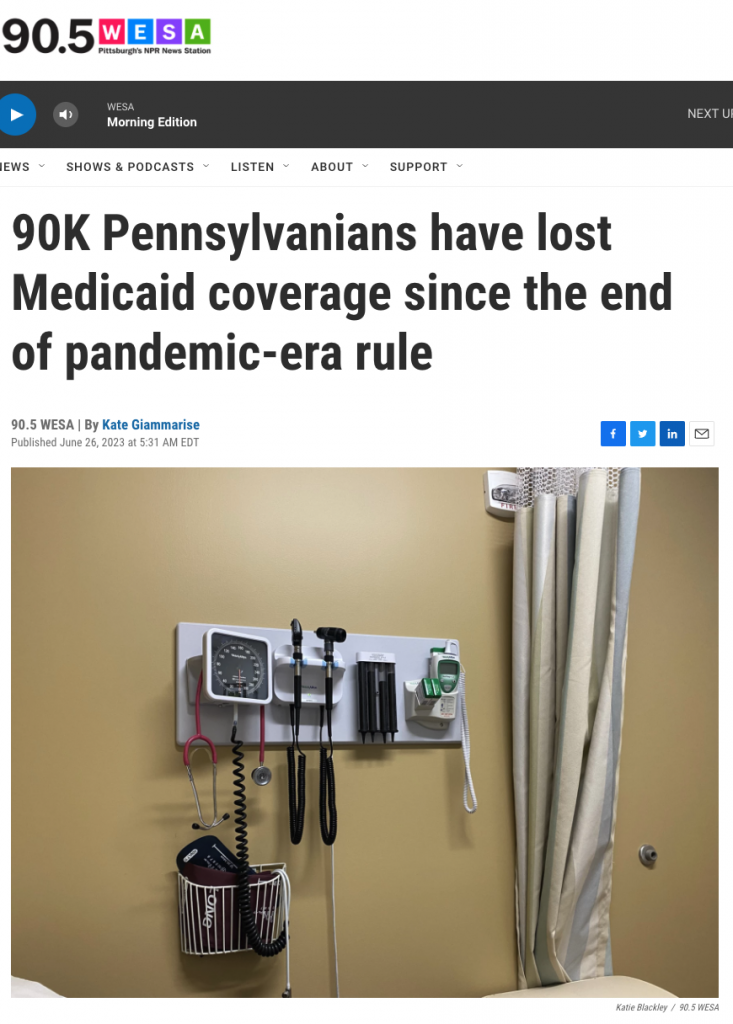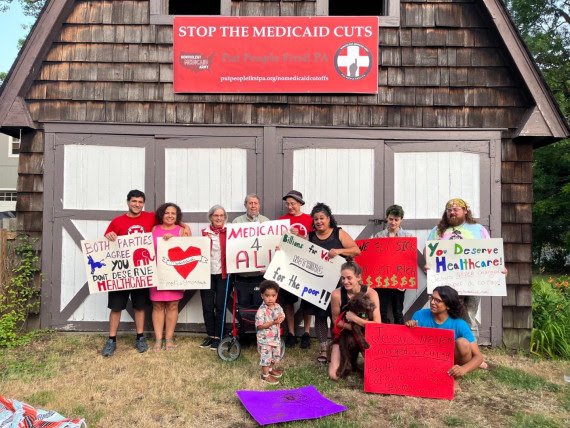The Medicaid unwinding: Some 31% of renewals processed so far have resulted in lost coverage
COVID-19 saw many habits upended; enrollment in Medicaid was no exception
POLLY HIGGINS
Pittsburgh Post-Gazette
phiggings@post-gazette.com
JUN 15, 2023 9:54 AM
Tammy Rojas was “stressed out of my mind.” They had one week to
complete their Medicaid renewal, and technology was not on their side.
“I was stressing and scrambling to get the stuff done,” the Lancaster
resident, 46, said. “I went on the website, but the part to file renewals
wasn’t working. … I thought to myself, ‘You’ve got to be kidding me.’”
Mx. Rojas, who works at a shelter for people experiencing homelessness,
is one of millions of Pennsylvanians once again navigating the Medicaid
reenrollment process.
In regular times, reupping is an annual ritual, like filing taxes. But
COVID-19 saw many habits upended, and enrollment in Medicaid,
known as Medical Assistance in the Commonwealth, was no exception:
Under the Consolidated Appropriations Act, millions of Americans were
afforded continuous coverage, so they were automatically reenrolled in
the free medical insurance.
Those pandemic-era protections ended on March 31, leaving the more
than 93 million people enrolled in Medicaid and CHIP nationwide, as of
February, with the task of determining their renewal dates and filing by
their individual deadlines.
The number of Medicaid recipients coming out of the pandemic is
unprecedented, as is the process of “unwinding,” or shifting such a mass
of people from a three-year pause back to the rhythms of an annual
enrollment cycle.
Mx. Rojas, a volunteer with health care activist group Put People First!
PA, was reenrolled — “I got lucky” — but not everyone will be. Or has
been.
The Biden administration sent up a flare on Monday, concerned about
the large number of Americans who have already been disenrolled for
largely administrative reasons, such as not having a current address on
file.
“I am deeply concerned with the number of people unnecessarily losing
coverage, especially those who appear to have lost coverage for avoidable
reasons that State Medicaid offices have the power to prevent or
mitigate,” Health and Human Services secretary Xavier Becerra said in a
June 12 letter to governors.
More than 1 million have lost coverage
Approximately 31% of renewals processed so far have resulted in a loss of
Medicaid or CHIP coverage, per the Centers for Medicare & Medicaid
Service.
CMS, through a spokesperson, declined to offer the actual number of
people cut off, though the Kaiser Family Foundation, which maintains a
Medicaid Enrollment and Unwinding Tracker, counts more than 1
million people who have lost coverage, based on data reported by 21
states.
In Pennsylvania, the hard number is 15,560, per DHS’s most recent
report in mid-May. They “have been determined to be ineligible for
Medicaid, either because of information in their renewal or because they
did not return a renewal,” a DHS spokesperson said in an email.
While states are in charge of their Medicaid programs, including the
logistics of the reenrollment process, they self-report data to HHS. That
process makes for a lag in numbers being publicly reported, so it’s
difficult to have a crystal clear sense of the actual scope of those being
disenrolled.
Mr. Becerra reminded governors of so-called flexibilities offered to each
state throughout the reenrollment process. For example, most states,
including Pennsylvania, have chosen to spread the undertaking across 12
months.
HHS also announced an expanded list of flexibilities, which now includes
a suggestion to reenroll someone “if able to do so based on available
information.”
While those new options are currently being reviewed by the state, a DHS
spokesperson said, the original list had been discussed “fairly
extensively.” And some recommendations, such as renewing people
based on eligibility for other programs, such as SNAP, are already part of DHS’s approach.
“DHS has similar processes in place already because Pennsylvania
currently aligns case processing as much as possible for households
participating in multiple programs,” the spokesperson said.
With DHS data reported through mid-May, more than 1.3 million people
make up the “total maintained population,” which consists of 1,245,424
individuals who have yet to complete a renewal and 77,129 who have.
Pre-pandemic, some 17 million people had their Medicaid or CHIP
coverage terminated every year, per a CMS spokesperson, “some because
they’re no longer eligible, but others because of red tape.” Multiply that
number by three (years), and the country is looking at, potentially, more
than 50 million terminations.
Awareness efforts crucial to renewal process
A huge component of the reenrollment process is education, and not
merely in terms of the administrative how-tos. A large swath of Medicaid
recipients don’t even know the unwinding is occurring.
“A recent survey of Medicaid enrollees found that two-thirds of people
were not sure if their state was returning to regular Medicaid
operations,” Mr. Becerra stated in his letter.
Awareness efforts have been baked into the unwinding, including
advertisements put out both by the state and CMS. A DHS spokesperson
said Pennsylvania had been planning for the return to annual
reenrollment of Medical Assistance and CHIP for more than a year.
The state’s DHS, the spokesperson said, “continued to send annual
renewal packages to Medicaid recipients throughout the pandemic, even
though no action would be taken on their coverage if they were no longer
eligible or if they did not return their renewal.”
But the obstacles for reaching those most vulnerable are many. Children
enrolled in CHIP are of particular concern, as are people without stable
home addresses.
“We are really focusing on folks with language barriers, also folks who
don’t have access to online capabilities, and those who aren’t receiving
their mail … and those who truly don’t know they’re up for renewals,”
said Tia Whitaker, statewide director of outreach and enrollment with
Pennsylvania Association of Community Health Centers.
Creative outreach solutions are threaded through the federally suggested
flexibilities, and they’re also being employed by community-level groups.
One such organization takes the meet-people-where-they-are approach
by educating folks about health care in laundromats.
Fabric Health first came to Pittsburgh in December, per co-founder
Allister Chang, after launching in Philadelphia earlier in 2022.
Representatives with the nonprofit can be found in five laundromats in
the Pittsburgh area.
Though Fabric Health helps clients with an array of health care issues,
the Medicaid unwinding has been a priority.
“We’ve been doing a lot of education and outreach around this because a
lot of Medicaid recipients don’t know quite what’s happening,” said
Jacob Hope, a health policy specialist with Fabric Health.
“There are plenty of people it is actually a big issue for,” Mr. Hope said,
citing individuals who have fluctuating incomes and/or move often. “You
have to send pay stubs, you have to send in this packet. … There are a lot
of administrative hurdles or burdens on people. That’s common.”
‘I wasn’t sure what I would do’
For Gary Rush, of Dormont, the first hurdle was a letter he said he
received stating he was going to lose his coverage.
“I must of gotten a letter on a Saturday. I didn’t open it up until Monday
night. It said I was going to lose my health coverage on April 20, which
was only a few days away,” Mr. Rush, 67, said.
Enrolled in Medicaid since before the pandemic, Mr. Rush, who is dual-
eligible for Medicare, wasn’t entirely clear why he was denied coverage.
“I guess it was one of my retirement funds,” he said of modest savings
including a 401K. He’s been on disability, he said, due to chronic back
pain that required surgery about five years ago and diabetes.
Encouraged by his mother to reach out to Put People First! PA, Mr. Rush
connected with the grassroots organization for assistance with filing an
appeal.
With that all-volunteer group’s help, “In one day we were able to file the
appeal. I wasn’t sure what I would do for health coverage,” Mr. Rush
said.
Mr. Rush joined about 30 people at a Put People First! rally outside the
state Capitol Building in Harrisburg on June 7, condensing his Medicaid
story into a minute as he told those gathered of his many health
challenges and the crushing math of his medication (one costs nearly
$700) and social security income that doesn’t inch far past.
In addition to demonstrations — the Harrisburg event was dubbed
“Caroling the Crisis” — the group has spread Medicaid renewal news in
myriad ways, from old-fashioned door knocking to a #MedicaidMondays
social media campaign that encourages people to share the importance of
the insurance to them.
An option at the heart of the group’s message would remove the need for
reenrollment entirely: Medicaid coverage for all.
Mr. Hope, also a volunteer with Put People First!, has been assisting Mr. Rush with his appeal.
As he awaits the verdict, Mr. Rush’s Medicaid has remained in place.
‘We have a range of oversight levers’
Adding to the challenges on the enrollee’s part is mere bandwidth on the
administrative end.
“Honestly, it’s a capacity issue,” said Antoinette Kraus, executive director
of nonprofit Pennsylvania Health Access, a Philadelphia-based health
care advocacy group, “because there are so many people who have to go
through Medicaid renewal.”
That stretching of resources, Ms. Kraus said, has manifested in long wait
times at call centers.
“We just encourage people not to give up,” she said, adding that, if
someone’s not sure about their status, a good starting point is the state
helpline, 800-692-7462. Medicaid recipients can check their renewal
dates at dhs.pa.gov/COMPASS as well.
Ms. Kraus noted that, in the weeks leading up to the end of continuous
enrollment, PHAN had seen “a definite uptick” in calls for help with the
renewal process.
DHS said its “call center operations are strong,” with average wait times
at five minutes in April, the latest month data is available for.
In his letter to governors, Mr. Becerra reminded states of HHS’s
regulatory prowess should they be noncompliant with federal
regulations, “and individuals must be afforded the due process to which
they are entitled in order for states to continue to receive enhanced
federal funding.”
“We have a range of oversight levers,” explained Dan Tsai, director of the
Center for Medicaid and CHIP Services, in a press call on Tuesday.
Center for Medicaid and CHIP Services, in a press call on Tuesday.
Should a state not follow the rules, he noted, Mr. Becerra has the
authority to place that state under a corrective action plan.
Polly Higgins: phiggijns@post-gazette.com
First Published June 15, 2023, 8:48am












